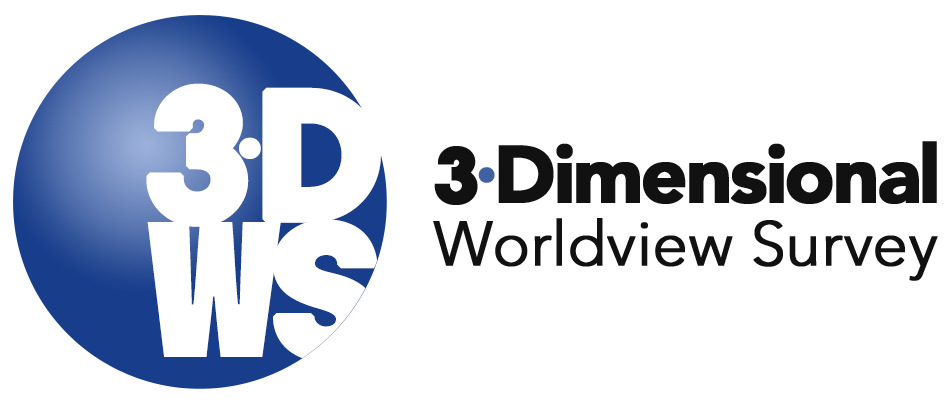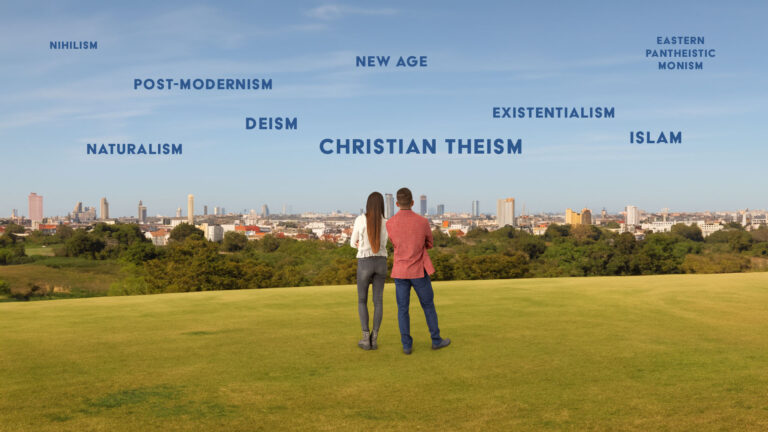Teaching Comparative Worldviews: Dialogues on Ultimate Reality
January 9, 2023
Katherine Schultz
Let’s start with a story.
3 Friends and Ultimate Reality
The smell of freshly brewed coffee wafted through the cozy corner of the local coffee shop, where three long-time friends gathered every week for deep conversations about their beliefs. Each person had a unique worldview, and today’s topic was ultimate reality.
As they settled into their familiar seats, Susan, a biblical theist, sipped her black coffee and began the conversation.
Susan (Biblical Theist): Hey, guys. I’ve been thinking a lot about the idea of ultimate reality lately as I’ve been reading James Sire’s Book, The Universe Next Door. For me, ultimate reality is all about God, the Creator of everything. In the Bible, it says, “In the beginning, God created the heavens and the earth.” What do you think is the foundation of reality that is the basis of everything?
Alex (Postmodernist): Interesting perspective, Susan. I see ultimate reality more as a collection of diverse perspectives. You know, there’s no one truth, no single narrative that captures everything. Reality is fragmented, shaped by our individual interpretations. It’s like what David Harvey said, “In the postmodern understanding, interpretation is everything; reality only comes into being through our interpretations of what the world means to us individually.”
Taylor (CRT Adherent): I get where both of you are coming from. But, for me, ultimate reality is deeply tied to systemic issues. I believe, like Kimberlé Crenshaw, that “racism is engrained in the fabric and system of American society.” Our ultimate reality is shaped by historical power structures, and we can’t separate our experiences from that reality.
Susan: I respect your perspectives, but my belief in God gives me a foundation for understanding the purpose behind everything. In the Bible, it says, “For from him and through him and for him are all things.” I find comfort in knowing that there’s a divine plan.
Alex: See, that’s where I struggle. I find meaning in the diversity of human experiences. No single truth can encompass all of that. Maybe our understanding of ultimate reality is limited, and we should embrace the multiplicity of truths.
Taylor: I agree with Alex to some extent. The diversity of experiences is crucial, especially when we’re talking about racial and social issues. But, for me, there’s a clear reality of systemic racism. It’s not just a subjective interpretation; it’s a harsh truth we need to confront.
Alex: (nodding) I get that. But don’t you think the idea of a single, objective reality can be oppressive? It often erases marginalized voices and perpetuates power imbalances.
Susan: (leaning forward) I see your point, Alex, but my belief in a higher power also leads me to a moral framework. The Bible guides me on how to treat others and live a purposeful life.
Taylor: (nodding) I respect your faith, Susan. But for me, addressing the systemic issues in our society is a moral imperative. We need to dismantle oppressive structures and work towards a more just reality.
As the conversation continued, the friends delved into their distinct beliefs, finding both common ground and areas of divergence. The coffee shop buzzed with the sound of dialogue, a reflection of the complexity inherent in exploring ultimate reality through different lenses.
Susan: (smiling) You know, it’s fascinating how our beliefs shape the way we see the world. For me, the Bible offers not just answers but a sense of purpose and hope. In Romans, it says, “Oh, the depth of the riches of the wisdom and knowledge of God! How unsearchable his judgments, and his paths beyond tracing out!” It’s a journey of faith, and I find strength in knowing there’s a higher power guiding our existence.
8 Questions Every Worldview Answers (even if they don’t know it)
Where would you go next in the conversation?
According to worldview experts, there are multiple different components of a person’s worldview, and the idea of ultimate reality is only one of them.
If you are a Christian with a biblical worldview, and you want to understand other people’s perspectives with a goal to be loving and respectful in sharing the good news of Jesus, and really understanding what they believe, it can be helpful to study worldviews in comparison.
That’s where a book like James Sire’s Universe Next Door can help. Sire sets out 8 questions that every worldview answers directly or indirectly when you dig into what its followers believe.
These are Sire’s questions:
- The Ultimate: What is prime reality – the really real?
- Nature: What is the nature of external reality , that is, the world around us?
- Human Identity: What is a human being?
- Death: What happens to a person at death?
- Knowledge: Why is it possible to know anything at all?
- Ethics: How do we know what is right and wrong?
- History: What is the meaning of human history?
- Orientation: What personal, life-orienting core commitments are consistent with this worldview?
You can see in the story how people with divergent worldviews might answer that first question. And you can imagine how different the answers would be for the other questions, too.
Studying Comparative Worldviews
Many people think of worldviews only in a religious context, but there is more to it. Worldviews affect multiple areas of our experience. For example, Summit Ministries has a chart of comparative worldviews that points out 10 different academic disciplines that different worldview perspectives would have different views on.
- Theology
- Philosophy
- Ethics
- Biology
- Psychology
- Sociology
- Law
- Politics
- Economics
- History
And that doesn’t include ideas like health, athletics, or the fine arts.
But the point is that a person might have a biblical worldview in his or her theology, but be deeply convinced of a different worldview in one of the other areas. And might not even realize the potential dissonance.
What’s a Biblical Worldview Teacher to Do?
One approach to worldview instruction is to help students more clearly see their own worldview (biblical or not) by diving into comparative worldviews, looking at what other belief systems would have to say about all areas of life.
- Tools for Teaching Comparative Worldview
- What Do My Students Think is a Biblical Worldview That Isn’t?
Of course beliefs are only a part of a person’s worldview. Here at 3-D Worldview Survey, we talk about the 3 dimensions of worldview as a person’s beliefs (the propositional dimension), their behaviors (the behavioral dimension), and their attitudes (the heart-orientation dimension).
Now What?
Getting insight into your students’ worldviews can be a great tool to help you mentor and disciple them as they grow in their understanding and implementation of a biblical worldview. We want our students to love God, and to live out their faith long after they leave our classrooms. Comparative worldviews can help them recognize when they are aligned with the Bible (or not), and give them insights as they seek to share the gospel with others in their lives.
And if you are convinced that a biblical worldview is more than just a person’s beliefs, then I encourage you to consider using a survey like the 3DWS to help you better understand your student’s beliefs, behaviors, and attitudes. And to see them become more self-aware as well.
- What Is the 3-D Worldview Survey?
- Take the 3-D Worldview for yourself
If you haven’t yet used the 3-D Worldview Survey with your class, check out the pdf below for some questions to get you started.
#teachingwordldview #3dworldview #biblicalworldview





